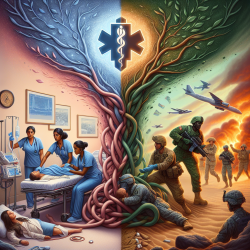Introduction
In the demanding world of emergency medicine, professionals are constantly exposed to high-stress situations. Whether in military or civilian settings, these environments require a unique blend of skills and coping mechanisms. The research article, Walk the line: a systemic perspective on stress experienced by emergency medical personnel by comparing military and civilian prehospital settings, provides valuable insights into the stressors faced by emergency medical personnel and the coping strategies they employ. This blog explores these findings and offers guidance for practitioners seeking to enhance their skills and resilience.
Understanding Stress in Emergency Medicine
The study highlights that emergency medical personnel, regardless of their setting, encounter extreme stressors. These include exposure to critical incidents such as mass casualties, severe injuries, and unpredictable environments. The research reveals that while military personnel often face war-related dangers, civilian counterparts deal with unpredictable threats that can feel personal and unprepared for.
The study uses a mixed-method approach, combining quantitative questionnaires with qualitative interviews, to delve deeper into how these professionals cope with stress. The results show a preference for task-oriented coping strategies, which help maintain operational performance while balancing emotional engagement with patients.
Coping Strategies: A Balancing Act
One of the key findings is the delicate balance between emotional disconnection and empathy. Emergency medical personnel strive to maintain enough emotional distance to perform effectively while preserving their humanity. This balance is crucial in preventing compassion fatigue and moral injury, which can arise from a lack of recognition and support.
The study emphasizes the importance of mutual trust within teams and between personnel and their organizations. Limited resources, lack of training, and inadequate support can lead to burnout and decreased motivation. Therefore, fostering a supportive environment is essential for sustaining the mental health and operational efficiency of emergency medical personnel.
Implementing Research Outcomes
Practitioners can improve their resilience by adopting the following strategies based on the research findings:
- Task-Oriented Coping: Focus on structured problem-solving and adherence to protocols to maintain performance under pressure.
- Emotional Awareness: Develop skills to recognize and process emotional responses to stress, enhancing stress-management strategies.
- Team Dynamics: Invest in building strong, trusting relationships within teams to improve communication and support.
- Organizational Support: Advocate for adequate resources, training, and recognition from the organizational level to prevent moral injury.
Encouraging Further Research
The study suggests that cross-pollination between military and civilian contexts can enrich training and support programs. Practitioners are encouraged to engage in further research to explore diverse coping strategies and enhance resilience across different emergency medical settings.
To read the original research paper, please follow this link: Walk the line: a systemic perspective on stress experienced by emergency medical personnel by comparing military and civilian prehospital settings.










